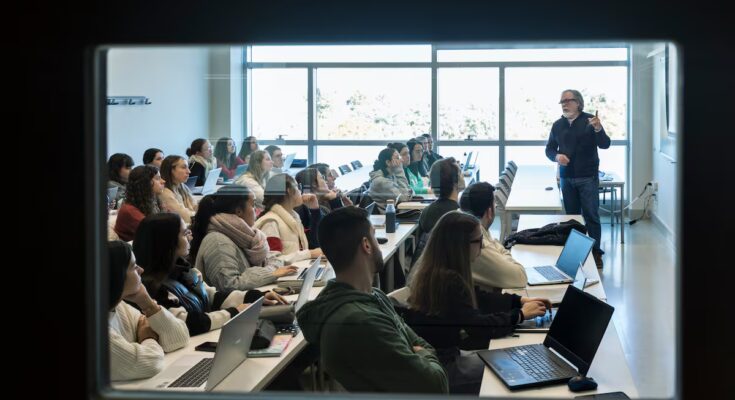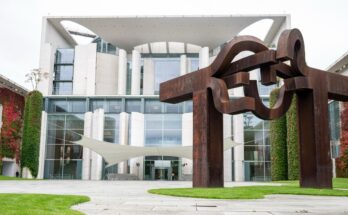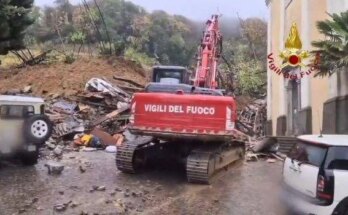Regardless of who it is, teacher education represents a field of educational knowledge that is not the property of a caste of empty and boring pedagogues, but rather the theoretical, research and practical heritage of a professional community long committed to understanding and improving teacher education on a national and international scale.
Carlos Fernández Liria (hereinafter CFL) published an article on eldiario.es, The teacher training scamthat caught my attention. I have devoted much effort to the topic over the past four decades of my teaching career, and given its importance, it seems appropriate to question any voices that seek to discredit it through bad art. It doesn’t seem bad to me that there is a finger (that of our author) pointing towards the moon (teacher training), but I think it is at least inappropriate that it is so mischievous and crooked, orchestrates so many hoaxes and takes part of the moon (Master of Teacher Training -MFP onwards) as a pretext for improper evaluations and opinions.
Before going into other details, I want to say that I cannot understand the crude language or the aura of contempt and epistemological supremacism with which the author surrounds himself to unleash any type of insult to the institutions (faculty of Education Sciences) and to certain professional figures (pedagogues): what would Freud say about that viscerality, what, for his part, Foucault, about the regime of truth that the CFL seems to possess.
I have no problem sharing the article in which the proposal of the Conference of Deans of the Faculties of Education Sciences to add an extra year to the initial training of teachers deserves some consideration and quite a few considerations and fears: more training time does not, in itself, mean greater quality of training. However, I fear that, apart from this coincidence, I maintain serious and well-founded disagreements with what CFL writes.
The first has to do with the use of MFP ratings that disqualify him. It is said that the OECD has evaluated him, as well as his university (UCM): both have issued negative sentences. Truly? Has the OECD evaluated our MFF, when and how? Could it be that TALIS makes some isolated reference to it and that this evaluation was obtained exclusively from the opinions of the teaching staff? And let’s see, with only 18.2% of UCM students who evaluated the master’s degree, it can be stated, as one does, that it is not solid because it is low “satisfaction” What does it cause? (note that this construct is overtly leftist).
As far as I know, neither the MFP has been evaluated beyond what ANECA does periodically (let’s leave aside now) nor is there an evaluation of other educational and social policies, which is a long overdue duty. But let’s not try to deceive the staff.
Secondly, another even denser topic, if possible. The article claims in no uncertain terms that, in 2008, the faculties of Educational Sciences perpetrated a “coup d’état in the Academy”: they imposed and made compulsory a master’s degree “in pedagogy” for “theoretical careers” (sic): exaggeration raises the bar and shoots it sky high. They did not impose the PMF, but that of Pedagogy as it is. And our colleague remains so calm. The hoax is spread, so that everyone understands and decides what to do with it; Some comments on the article, which I took the trouble to consult, confirm it with the same frivolity as the original, so here we go: genuine and sad culture and practice impostor.
Does the CFL not know where and by whom the MFP, which reached beyond the Pyrenees, was born? Nor the why, what for and the requirements to be met to obtain the required approvals? Well, it wouldn’t be bad to know it, evaluate it in its sense and, moreover, without ceasing to valorise certain times and certain current powers with their veto capabilities. The MFP was the only way (solicited from outside) to overcome the structural and inveterate denialism of the so-called “theoretical areas” which feared losing power and clientele if they had organised, as was once proposed, their own full teaching career, and not a supplement to disciplinary qualifications, which is what the MFP has been and continues to be. Not pedagogical powers or anything like that, but a pure and open influence of the hegemonic university powers; a much more prosaic question, after all. Their attacks continued until the moment of implementation of the new master’s degrees in universities. The vice-rector of studies of each university, in the preparations and in the first phases of the Bologna Process, convened all the university areas substantially affected. The effects were symptomatic: in a university like mine, more than fifty of us gathered in a meeting for explanations and possible distributions in light of one of the most inveterate logics in the house: “and mine?” Efforts to participate lasted just long enough for staff to realize that, in fact, there was nothing to distribute.
A third truth which, once things have been clarified, the reader will be able to appreciate is that the article suggests that the faculties of Education Sciences are what they are and violate common sense because they are sad and their members lack the nectar of the joy of knowledge: they should therefore be abolished, without further ado. The original reason for all this is that they are inhabited and controlled by a caste of embittered people, the pedagogues (what have we all done, without exception, to this man to deserve so much resentment?).
I am able to state categorically that there is no faculty in our universities more hospitable and open than that of Educational Sciences: there are philosophers who must not please the CFL philosopher, psychologists, sociologists, economists, specialists corresponding to all the disciplines of the secondary, primary and early childhood curriculum and their respective teaching methods. So no pedagogue who does not know mathematics teaches anyone this knowledge: doctors in Mathematics Education do it, and so on in all the other “theoretical areas”, as the CFL says. Are they all devoid of substantial knowledge, are they all speaking and teaching what they do not know, are they all, by the fate of some epistemic Olympian god, deprived of the pleasure of knowledge?
Finally, there is another side, which in the end is the most relevant. It refers to the dilemmatic tension that the article raises between knowledge, teaching and learning, between content and the development of skills and competences (let’s not go into the polysemy of these terms now). In the article you will find verbatim or abbreviated sentences such as: “the greatest incentive to knowledge is knowledge”, “human beings want to know, we must not instill knowledge in them by treachery or by playing with the potato ring”, “knowledge imposes itself, the problem is wanting to awaken interest in it”.
If what was said in the previous points seems little more than noisy refusals, what is discussed now fully enters into crucial questions. Somehow it connects to something that is seriously affecting our education. The desire to falsely contrast knowledge (what is worth teaching and learning in school) and pedagogy (facilitating student learning) may be a symptom worthy of attention. Perhaps he is no stranger to something that is in sight. We have statistics that point to the (approximate) fact that, taking the age group of the population between 18 and 35, about half of the people have a higher education, while, at the other extreme, there are almost similar figures that result from the addition of those who did not graduate from ESO, left education prematurely and are not working or studying. They attended school, they were offered knowledge, but thousands upon thousands of our youngest citizens lacked the thoughtful explanations that so many teachers gave them.
Our teacher education is still waiting for a diagnosis that illuminates what is happening and what needs to be improved, a profound transformation based on knowledge and best available practices, a firm commitment to correcting educational inequalities that not only violate people’s rights, but also the very existence of a democratic, just and livable society.



